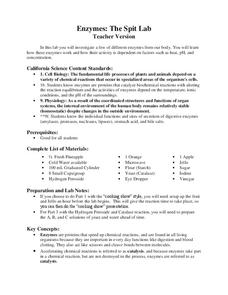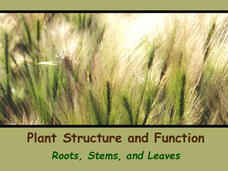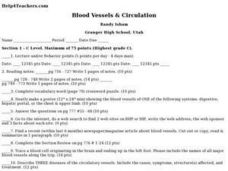Curated OER
Save a Reef!
Design a public information campaign to improve understanding of the coral reef crisis. Read about and discuss the biology and threats to the coral reef. The class creates a public information program about the problems facing the coral...
Curated OER
How do Hypotonic, Hypertonic, and Isotonic Solutions Affect the Water Movement of a Cell?
After removing the shell from a raw egg, cell biologists soak the egg in either a hypotonic, hypertonic, or isotonic corn syrup solution. They calculate the percent change in mass and compare it to the strength of the solution in a...
LABScI
Vision Lab: The Eye
Our bodies have some amazing capabilities, but there are some limitations. Explore the limitations of the human eye through the eighth lab activity in a series of 12 biology lessons. Individuals measure their own peripheral vision and...
Curated OER
Are Adult Pancreatic Beta Cells Formed by Self-duplication or Stem Cell Differentiation?
A case-study of Dr. Melton's experiment on pancreatic cells highlights this worksheet. Details of the study adorn the first three pages, complete with diagrams. Biology buffs then analyze the data and identify problems within the...
Curated OER
The Nobel Prize in Chemistry 2003 - Information for the Public
An information-packed eight-page article detailing the history of understanding active transport across cell membranes makes up the bulk of this handout. Two pages of reading comprehension and critical-thinking questions follow. The...
Curated OER
Changing Planet: Infectious Diseases Classroom Activity
Here is a different approach: emerging epidemiologists first go home to interview family on the topic of infectious disease. Then they come to class and view a video and PowerPoint that explore how climate change may increase the...
Virginia Department of Education
Go with the Flow
How does nature's hierarchy relate to our local human environment? Answer this question, along with others, as the class visually depicts the natural hierarchy provided by nature. Pupils discuss each piece of the pyramid and its energy...
LABScI
Enzymes: The Spit Lab
Enzymes in our bodies each have a job to do. Learn the factors that affect the activity of some enzymes using the third activity of an informative 12-part biology series. A three-part laboratory activity asks teams to investigate how...
Biology Junction
Plant Structure and Function: Roots, Stems, and Leaves
Scientists found fossils of plants more than 420 million years old—but plants existed for up to 100 million years prior to these fossils. Learn about the importance of plants to the entire planet. Viewing a presentation helps scholars...
Curated OER
What Do We Have In Common?
Seventh graders perform a dissection on a mussels and label their internal organs. In groups, they compare and contrast the mussels structure to those of human beings. They also review the functions that are necessary for survival and...
Curated OER
Blood Business
Students identify the different kinds of blood. In this biology lesson, students investigate the antigens, agglutinins and Rh factor using their own blood. They use Punnett squares to predict blood type of offspring.
Curated OER
Movement, it's FUN-damental!
High schoolers discover how muscles work. In this biology lesson plan, students explain the causes of fatigue and muscle soreness. They create graphs and compare results with their classmate.
Curated OER
Brain Watching
Students identify the different parts of the nervous system. In this biology lesson, students research methods to diagnose and cure neurological disorders. They present their report to class.
Curated OER
BLAST Algorithm
Students explore a series of activities on using BLAST. In this biology instructional activity, students explain the significance of BLAST in DNA query. They give real world applications of BLAST.
Curated OER
Animal Forms
Students demonstrate similarities and differences in animal forms, including humans.They investigate geometric relationships within those forms by building an animal using Zome System elements.
Curated OER
Taxonomy
In this biology worksheet, students complete a crossword puzzle with 39 questions on taxonomy. They identify the different classification systems used in biology.
Curated OER
How We Learn About the Brain: Teaching the Infant Brain
Students describe the development of an infant from conception to birth. In this biology lesson, students discover how a child's brain develop. They explain how children acquire motor and cognitive skills.
Curated OER
Protection, Support, and Locomotion
In this human body worksheet, students will review 5 terms associated with the skin by filling in the blank. Then students will read 14 statements about the human skeleton and muscles and determine if its true or false.
Curated OER
Teaching Animal Rights
In this biology worksheet, students engage in the reading of the rights of educators to teach concerning the issue of using animals for educational purposes.
Curated OER
Major Functions
Seventh graders investigate the basic characteristics and needs of living things. They identify the major parts of plants and animals by making lists. Students focus upon one living thing and speculate how if one part is changed how it...
Curated OER
Totally Cellular
In this biology instructional activity, students learn about cells and their various parts. They first read a page and a half of facts about cells and then answer the 10 questions in the packet. The answers are on the last page.
Curated OER
Blood Vessels & Circulation
Students participate in a layered curriculum designed lesson in order to study the cardiovascular system of the human body. The assessments and activities are student centered.
Curated OER
Biological Relationships - Coral Reef Memory Game and Chain Game
Young scholars familiarize themselves with the interconnectedness of species within an ecosystem, and to use this knowledge to evaluate how the removal or decimation of one species can have far reaching effects.
Curated OER
Standard 4 Review Sheet-Key Ideas Biology-The Living Environment
In this living environment worksheet, students answer a variety of questions about living organisms, the processes they go through to make food and break down food, absorb nutrients, and release toxins. They explain homeostasis, they...

























